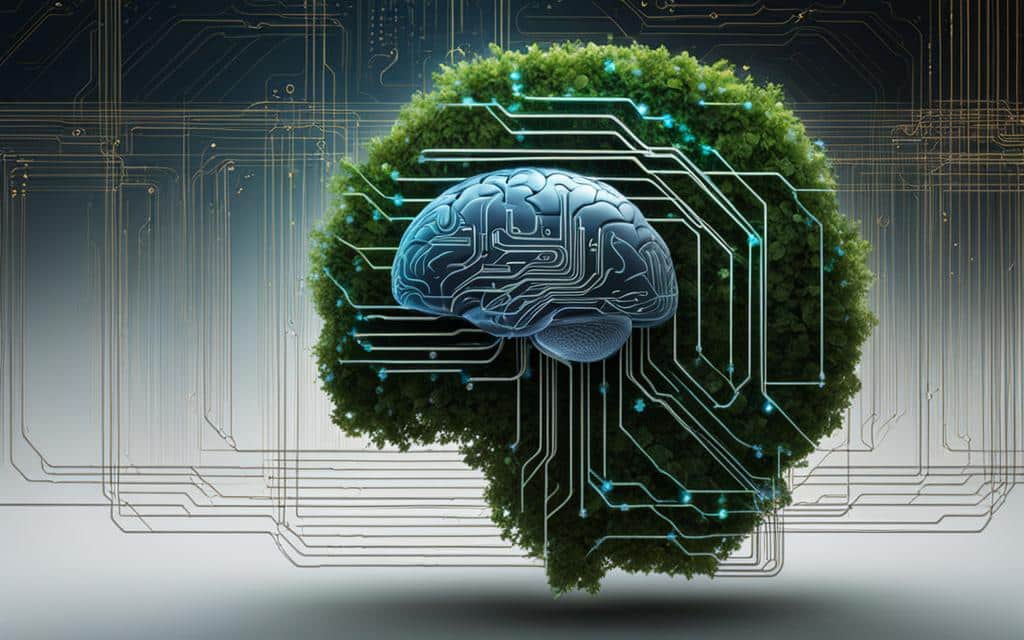Table of Contents
Artificial intelligence (AI) in the field of SEO has revolutionized keyword strategies, search rankings, and online visibility. With AI-powered algorithms analyzing vast amounts of data, the accuracy and relevance of search results have significantly improved. SEO professionals can now leverage AI to develop more effective content optimization strategies, identify new keywords, and gain insights into user behavior and engagement.
In this article, we will delve into the role of AI in SEO, its impact on search engine algorithms, and the importance of user intent in content creation. We will also explore how AI-powered tools can enhance content optimization and keyword research. Additionally, we will discuss Google’s innovations and the future of SEO in the context of AI-powered technologies.
Join us as we explore the transformative power of artificial intelligence in shaping the future of SEO and discover how adapting your strategies to embrace AI can lead to sustainable success in the ever-evolving digital landscape.
Understanding AI and its role in SEO
AI, or Artificial Intelligence, plays a crucial role in the world of SEO. By utilizing machine learning algorithms, AI has the ability to analyze vast amounts of data and predict the most relevant content for search queries. This advanced technology has revolutionized the way search engines, including Google and Bing, deliver search results, improving their accuracy and relevance.
For content creators and SEO professionals, AI presents a valuable opportunity to enhance their strategies and improve search rankings. AI-powered tools assist in identifying new keywords and topics, enabling them to optimize their content for maximum visibility. By analyzing the performance of their content and making data-driven changes, content creators can effectively improve their SEO rankings and drive organic traffic to their websites.
One of the key advantages of AI in SEO is its ability to analyze large amounts of data. Traditional methods of keyword research often fall short when it comes to handling the ever-increasing volume of information available on the internet. AI-powered tools, on the other hand, excel in this aspect, ensuring a comprehensive analysis of keyword trends and search behavior.
“AI-powered algorithms analyze data to predict relevant content for search queries, improving the accuracy and relevance of search results.”
The Power of Machine Learning Algorithms
At the heart of AI in SEO lies machine learning algorithms. These algorithms have the capability to analyze and interpret complex patterns and correlations within data, enabling search engines to deliver more precise search results. By continuously learning from user behavior and search patterns, AI algorithms enhance their understanding of user intent, resulting in better search rankings.
With the help of AI and machine learning algorithms, search engines can personalize search results based on individual preferences and behaviors. This personalization creates a tailored user experience, leading to higher engagement and relevance. As a content creator, understanding how AI algorithms work can guide your content creation process, helping you develop targeted and user-centric content that aligns with search engine requirements.
The Benefits of AI in SEO
AI-powered tools are a game-changer when it comes to content optimization for search engines. These tools provide insights into keyword trends, search volumes, and competition, helping content creators make informed decisions about their SEO strategies. By leveraging AI, content creators can:
- Identify and analyze new keywords to target.
- Optimize existing content based on data-driven insights.
- Enhance user experience by tailoring content to user intent.
By utilizing AI in SEO, content creators can stay ahead of the competition and improve their search rankings by delivering high-quality, relevant content that resonates with their target audience.
As AI continues to evolve and shape the future of SEO, it is crucial for content creators and SEO professionals to embrace this technology and adapt their strategies accordingly. By leveraging the power of AI, they can unlock new opportunities for sustainable SEO success and ensure their content is optimized to meet the ever-changing demands of search engines and users alike.
How AI is changing search engine algorithms
The rise of artificial intelligence (AI) has brought about significant changes in search engine algorithms. AI-powered search algorithms have the ability to understand user intent, personalize search results, and improve the overall quality of content. This transformative technology has revolutionized the way search engines operate and deliver relevant information to users.
Understanding user intent for accurate search results
AI-powered search algorithms excel at understanding user intent behind search queries. By analyzing data patterns and user behavior, these algorithms can determine the underlying purpose of a search and deliver more accurate and relevant results. This not only enhances the user experience but also ensures that the content displayed is aligned with the user’s needs and preferences.
Personalizing search results based on user behavior
Another key impact of AI in search engine algorithms is the ability to personalize search results. AI analyzes user behavior, such as search history, location, and preferences, to provide customized search results for each individual. This personalization enhances user satisfaction and increases the chances of finding the most relevant information.
The use of AI in search engine algorithms enables a more personalized and tailored search experience, catering to the unique needs and preferences of individual users.
Improving content quality and relevance
AI also plays a crucial role in improving the overall quality and relevance of search results. By analyzing large amounts of data, AI-powered algorithms can identify high-quality content that meets user expectations. This results in a more accurate ranking of webpages and ensures that users are presented with content that is not only relevant but also of high quality.
| Benefits of AI-powered search algorithms | Impact on SEO |
|---|---|
| Understanding user intent | Ensures that SEO strategies align with user needs and preferences, improving search rankings |
| Personalizing search results | Increases user satisfaction and engagement, leading to higher organic traffic and conversions |
| Improving content quality | Allows SEO professionals to create high-quality content that meets user expectations, enhancing search rankings |
The importance of user intent in content creation
In order to develop relevant content and improve search rankings, it is crucial for content creators to understand user intent. User intent refers to the reason behind a search query, and aligning content with user intent can significantly impact search engine optimization (SEO) performance. This requires conducting thorough keyword research to uncover the keywords and phrases used by the target audience.
Keyword research helps content creators gain insights into the language and terminology their audience uses, enabling them to create content that resonates with their users. By understanding user intent, content creators can address the specific needs and interests of their target audience, resulting in higher engagement and better user experience.
Developing content that aligns with user intent also improves search rankings. Search engines are continuously evolving to better understand user intent and provide the most relevant results. By creating content that matches what users are looking for, content creators increase their chances of ranking higher in search engine results pages (SERPs).
Content creators should focus on creating valuable and informative content that directly addresses the questions or problems their audience is trying to solve. By addressing user intent, content creators not only improve search rankings but also establish their authority and credibility in the industry.
Creating content that aligns with user intent is not just about using the right keywords. It’s about understanding what your audience is searching for and providing them with the most relevant and valuable information. By doing so, you can attract more organic traffic and improve the overall performance of your website.
To illustrate the importance of user intent, consider the following example:
| User Query | Content A | Content B |
|---|---|---|
| How to clean a laptop screen? | Content A provides a step-by-step guide with images, cleaning solutions, and tips for safely cleaning a laptop screen. | Content B talks about the importance of keeping the laptop screen clean for optimal performance without providing any practical advice or solutions. |
| Which laptop is best for gaming? | Content A compares the top gaming laptops in terms of specifications, performance, and user reviews, helping users make an informed decision. | Content B discusses the benefits of gaming laptops without providing any specific recommendations or comparisons. |
In both examples, Content A aligns with the user intent by directly addressing the query and providing relevant and valuable information. On the other hand, Content B does not meet the user intent, resulting in a less satisfying user experience. Search engines prioritize content that meets user intent, which ultimately affects search rankings.
By understanding user intent and creating content that aligns with it, content creators can improve search rankings, attract more organic traffic, and enhance the user experience on their websites.
How AI-powered tools can improve content optimization
AI-powered tools have revolutionized content optimization by providing content creators with valuable insights and data-driven recommendations. These tools utilize the power of artificial intelligence to analyze vast amounts of data and identify new keywords and topics that are currently trending among the target audience.
By using AI-powered tools, content creators can optimize their content for improved search rankings and online visibility. These tools analyze user behavior and engagement, allowing content creators to make informed decisions about content improvements and enhancements.
- Analyze data: AI-powered tools have the ability to analyze data from various sources, including search engines, social media platforms, and user behavior metrics. This analysis provides valuable insights into what type of content is resonating with the target audience and can guide content creators in creating more relevant and engaging content.
- Identify new keywords and topics: AI-powered tools can identify emerging keywords and topics that are gaining popularity among the target audience. This allows content creators to stay ahead of the curve and create content that aligns with the interests and needs of their audience.
- Optimize content: AI-powered tools can provide recommendations for optimizing content based on data analysis. These recommendations may include suggestions for keyword placement, content structure, and formatting to improve search rankings and increase organic traffic.
- Address technical SEO issues: AI-powered tools can also help content creators identify and address technical SEO issues that may be affecting the performance of their content. These issues may include broken links, duplicate content, or slow page load times.
- Provide insights into content distribution and promotion strategies: AI-powered tools can analyze data on content distribution and promotion strategies, providing insights into what channels and tactics are most effective in reaching the target audience. This information can help content creators optimize their content distribution and promotion efforts for maximum impact.
Overall, AI-powered tools are invaluable resources for content creators looking to optimize their content and improve their SEO performance. By leveraging the power of AI, content creators can stay ahead of the competition, adapt to evolving search trends, and achieve sustainable SEO success.
The impact of AI on keyword research and analysis
Artificial Intelligence (AI) has revolutionized the field of keyword research and analysis, providing SEO professionals with powerful tools to optimize their content strategy. By harnessing AI technology, businesses can now uncover valuable insights into search trends, user behavior, and discover untapped opportunities for improved search rankings and online visibility.
Identifying Long-Tail Keywords with AI
One of the key contributions of AI in keyword research is its ability to identify long-tail keywords. Unlike generic keywords, long-tail keywords are more specific and targeted, catering to niche audiences and capturing highly relevant search queries. AI-powered tools analyze vast amounts of data to unearth these long-tail keywords, enabling businesses to develop content that precisely addresses the needs and interests of their target audience.
Analyzing Related Keywords and Topics
AI-powered tools not only assist in identifying long-tail keywords but also provide valuable insights into related keywords and topics. By analyzing data from various sources, AI algorithms can uncover connections between different search terms and identify topical clusters. This information helps content creators to develop comprehensive content strategies, incorporating related keywords and topics that resonate with their target audience.
| Benefits of AI in Keyword Research | Insights from AI-powered Tools |
|---|---|
| Identify long-tail keywords | Explores niche opportunities for targeted content |
| Analyze related keywords and topics | Seeks connections between search terms for comprehensive content strategy |
| Evaluate search volume and competition | Understand keyword popularity and optimize content accordingly |
Evaluating Search Volume and Competition
AI provides valuable insights into search volumes and competition for specific keywords. By analyzing vast amounts of data, AI-powered tools can determine the popularity of different keywords and phrases, allowing businesses to prioritize their content optimization efforts accordingly. Additionally, AI algorithms analyze the competitive landscape for each keyword, helping businesses understand the level of difficulty in ranking for a particular keyword.
With AI-guided keyword research and analysis, businesses can optimize their content strategy by targeting long-tail keywords, incorporating related topics, and understanding the search volumes and competition for specific keywords. By harnessing the power of AI, businesses can unlock new opportunities for improved search rankings and drive targeted organic traffic to their websites.
AI-powered tools analyze vast amounts of data to uncover valuable insights and opportunities for improved search rankings and visibility.
How Google’s innovations and search generative experience impact SEO and traffic
Google’s constant innovations in search technology have greatly influenced the field of SEO and its impact on website traffic. One significant innovation is the introduction of the search generative experience (SGE), which has the potential to reshape the way users interact with search results and affect the traffic received by websites.
The SGE allows users to obtain information directly on the search results page without having to visit individual websites. While this convenience reduces the need for users to click through to websites, it can also affect the overall traffic received by those sites.
“SGE may reduce top-level site traffic as it satisfies user queries directly on the search results page.”
However, it’s important to note that the traffic that does reach a website through SGE may be more targeted. Users who choose to visit a site after viewing the search results page are likely to have a specific intent or interest related to the website’s content.
Additionally, Google’s innovations, including SGE, can impact the specific SEO strategies that website owners and SEO professionals employ. To adapt to these changes, it’s crucial to focus on enhancing page experience and optimizing content to provide better customer experiences. These efforts can help attract and retain targeted traffic, potentially leading to higher conversion rates.
To better understand the impact of Google’s innovations and SGE on SEO and traffic, let’s look at an example:
| Before SGE | After SGE |
|---|---|
| A user searches for “best hiking boots.” | A user searches for “best hiking boots.” |
| They click on multiple search results, exploring different websites. | They find a comprehensive list of top-rated hiking boots directly on the search results page. |
| They visit a website that provides in-depth reviews of different hiking boots. | They don’t need to visit any specific website as they obtain all the information they need from the search results page. |
This example illustrates how SGE can impact website traffic. While the user in the “Before SGE” scenario visits multiple websites, the user in the “After SGE” scenario doesn’t need to leave the search results page to gather the required information. However, if the website offering in-depth reviews optimizes its content for SGE, it can still attract traffic by being featured prominently in the search results.
Conclusion
AI has revolutionized SEO and will continue to shape the future of the industry. As AI-powered algorithms become more sophisticated, SEO professionals need to adapt their strategies to leverage the benefits of AI while staying true to core SEO principles. By embracing AI in SEO, businesses can unlock new opportunities for online visibility and sustainable success in the ever-evolving digital landscape.
The future of SEO will be driven by AI-powered technologies such as generative AI and automation. These technologies will streamline processes and enhance SEO performance, enabling businesses to stay ahead of the competition. By adopting agile SEO strategies that incorporate AI, businesses can adapt to changing search algorithms and consumer behaviors, ensuring their long-term success.
However, while AI is transforming the SEO landscape, it is important to remember that core SEO principles remain fundamental. AI should be used as a tool to augment and optimize SEO efforts, not as a replacement for strategic thinking and content creation. Keeping a balance between AI-driven insights and human creativity is key to developing relevant and engaging content that resonates with target audiences.
In summary, AI in SEO is not just a passing trend, but the future of the industry. By adapting SEO strategies to leverage AI-powered technologies and staying true to core SEO principles, businesses can achieve sustainable SEO success in the dynamic and competitive digital landscape.
FAQ
How does AI impact SEO?
AI revolutionizes keyword strategies, improves search rankings, and enhances online visibility.
What is the role of AI in SEO?
AI uses machine learning algorithms to analyze data and improve search results.
How is AI changing search engine algorithms?
AI-powered algorithms understand user intent, personalize search results, and improve content quality.
Why is user intent important in content creation?
User intent drives keyword research and helps develop relevant content to improve search rankings.
How can AI-powered tools improve content optimization?
AI-powered tools analyze data, identify new keywords and topics, and optimize content for better SEO performance.
What impact does AI have on keyword research and analysis?
AI helps identify long-tail and related keywords, provides insights into search trends and volume, and enhances keyword research.
How do Google’s innovations and search generative experience impact SEO and traffic?
Google’s innovations, like search generative experience, may impact site traffic but can lead to more targeted traffic and potential conversion rate improvement.
How does AI shape the future of SEO?
AI will continue to revolutionize SEO with generative AI and automation, streamlining processes for enhanced performance.













